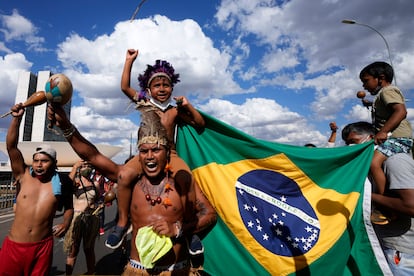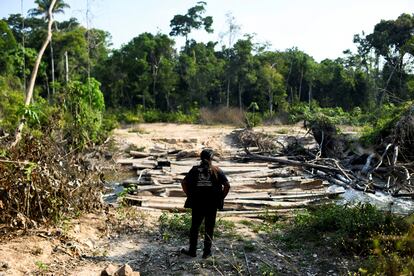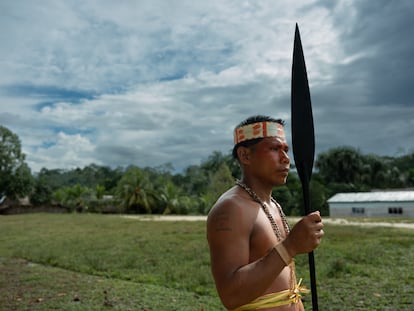Attacks on indigenous people doubled during the Bolsonaro years: almost 800 were killed
The annual report by the Indigenous Missionary Council links the increase in violence to the dismantling of policies and the far-right rhetoric of the ex-president

Brazil’s indigenous peoples often say that they have been resisting for exactly 523 years, the time since the first Portuguese ships appeared on the horizon line. The annual report of the Indigenous Missionary Council (CIMI), released this Thursday, proves that in the last four years, the first president in the history of Brazilian democracy who was openly belligerent against the indigenous cause forced them to make an extra effort of resistance: during the administration of Jair Bolsonaro, violence against indigenous people multiplied exponentially, with 795 individuals killed, 180 of them in 2022.
In the almost 300-page document, this organization with ties to the Catholic Church collects official data from all the states in the country to put together a comprehensive picture of attacks in recent years, which are closely linked to the policies of the former president. Cases of violence against indigenous people (murders, death threats, bodily harm, racism or sexual violence) reached an average of 373.8 per year, with an increase of 54% compared to the previous four years (under the governments of Michel Temer and Dilma Rousseff).
“The intensity of the attacks cannot be understood outside the frame of the dismantling of the indigenist policies and environmental protection institutions that the government had been committed to during the term of Jair Bolsonaro,” reads the report. The former president took office with the promise not to dedicate “one more centimeter” of land to indigenous peoples, and he delivered on that pledge, despite the fact that the Constitution requires legal recognition of territories historically occupied by native populations. The government tried repeatedly to pass laws to allow the exploitation of indigenous lands, and undermined from within the agencies that should have protected these communities, which ultimately led to a scenario of conflicts, defenselessness and legal uncertainty. In 2022 alone, there were 309 cases of property invasion on indigenous lands.

Last year, in states such as Mato Grosso do Sul, Maranhão and Bahia, disputes over land and a lack of protection led to the murder of indigenous people, sometimes involving police forces operating as ‘private security’ for big farmers, says the report. In Comexatibá Indigenous Land, in southern Bahia, a 14-year-old Pataxó boy named Gustavo Silva da Conceição was brutally killed during one of several shootings perpetrated by militias. Cases like this one are recurring. In the State of Mato Grosso do Sul, which exports thousands of tons of soybeans every year, the Guaraní Kaiowá people have been facing up against the all-powerful Brazilian agricultural sector for decades. After claiming as ancestral territory what is currently registered as the Guapoy farm, there was a violent expulsion by the Military Police that ended with one death, Vitor Fernandes, and dozens of wounded.
None of these murders had a media coverage comparable to the deaths of the British journalist Dom Philips and the indigenous advocate Bruno Pereira in June of last year. Their bodies were dismembered and burned in the Vale do Javari, the region in the world with the most uncontacted indigenous peoples. The report certifies that shortly after the terrible homicide, threats against indigenous people in the region continued.
Especially serious is the situation of the Yanonami people, in the north of the country, on the border with Venezuela. In recent years, Bolsonaro’s permissive attitude towards illegal mining on indigenous lands has led to the arrival of more than 20,000 garimpeiros in search of gold. Far from disavowing the activity, the president went so far as to visit an illegal excavation on the Raposa Serra do Sol indigenous land to express his support. Among the bloodiest deaths of last year, the report cites that of a 12-year-old Yanomami teenager who was raped and murdered by garimpeiros in a village in the Waikás region, one of the most intensely affected by illegal mining.
The invaders contaminate rivers with mercury, which in turn destroys fishing, the main source of food for these indigenous people. The result of years of state negligence became apparent last January, when images of starving Yanomami adults and children, with their ribs exposed, went around the world. The government of President Luiz Inácio Lula da Silva mounted a complex operation to expel the garimpeiros, but the consequences will take time to disappear. One of the most chilling data in the document is found in the category on deaths due to “omission of the state,” especially due to lack of health care. Between 2019 and 2022, a total of 3,552 indigenous children between the ages of zero and four died for this reason, 35% more than in the previous four years.
Of these deaths, the CIMI identified 1,504 that occurred due to preventable causes, such as diarrhea, fever, pneumonia or malnutrition. The Yanomami territory, again due to the invasion of the garimpeiros, was the most affected. Despite the fact that only 4% of Brazilian indigenous people live here, 17.5% of deaths due to the absence of adequate public policies occurred here, with 621 children dying in the last four years. Experts believe that the number could be higher, since there are areas of very difficult access where the garimpeiros still occupy the precarious health posts scattered throughout the jungle. The report speaks on several occasions of genocide and calls for the creation of a National Indigenous Truth Commission, like the one set up to investigate the crimes of the military dictatorship.
Sign up for our weekly newsletter to get more English-language news coverage from EL PAÍS USA Edition
More information

Former Brazilian President Bolsonaro fades from the spotlight








































